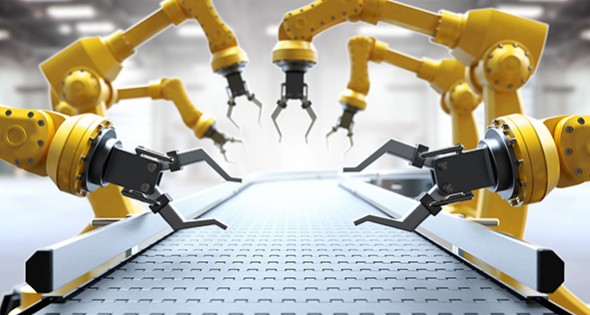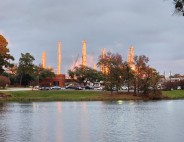
Robots Doing Factory Jobs
07 Nov, 2017
Depending on the angle from which you’re looking at the crystal ball, automation is either an imminent wave of large-scale labor force devastation or a slower, more muted change that society will seemlessly absorb—and maybe even enjoy.
A recent paper by M.I.T’s Daron Acemoglu and Boston University’s Pascual Restrepo explores this debate. The economists find that automation in the manufacturing industry has had quite adverse effects on employment and wages—and will continue to do so. While aspects of the study’s design and big-picture takeaways have been contested, this much is clear: robots have reshaped urban economies and labor markets—some more than others.
A new map, created by researchers at the Brookings Institution’s Metropolitan Policy Program, supports that case. Using the same dataset as the MIT economists, researchers pinpointed metros where industrial robots—defined as “automatically controlled and reprogrammable machines” that can perform tasks traditionally done by human workers—have been concentrated since 2010.
“At a minimum these technologies create near and medium term transition issues for workers,” says Mark Muro, a senior fellow and policy director at Brookings. “And that’s even if they do create additional jobs in new areas as some analysts insist.”
To see the map and read more, read the entire article.
Related Posts
-

IONNA, LLC, to Invest $10M in Global Headquarters in Durham, North Carolina, Creating 203 Jobs
-

Construction, Manufacturing and Fabrication Innovator RNGD Invests $25 Million to Expand Southeast Louisiana Operations, Create 130 Direct New Jobs
-

Novo Nordisk to Expand Johnston County, NC Operations with $4.1B Investment, Creating 1,000 New Jobs
-

Gov Kemp: Food Solutions Company Cargill to Create 400 New Jobs in Metro Atlanta Office Hub
-

RoyOMartin Announces $30 Million Modernization of Timber Manufacturing Facility in Southwest Louisiana
-

Four Business Expansions Bring 144 Jobs to Kent, Bay Counties
-

Sodexo Opens Its New North American Headquarters
-

FUJIFILM Diosynth Invests $1.2B in Holly Springs, North Carolina, Manufacturing Facility, Creating 680 New Jobs
-

Eastman’s second U.S. molecular recycling facility will be in Longview, Texas
-

Wisk and the City of Sugar Land, Texas, Partner to Bring Autonomous Air Taxis to the Greater Houston Region









